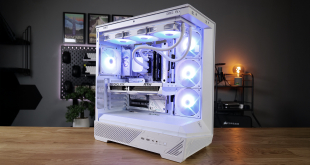ADATA's XPG V2 2800MHz CL12 8GB is a solid set that shows good overclocking headroom. The looser timings, in comparison to many slower kits, have an impact on performance, but some tweaking should allow the deficit to be minimised or negated.
With loosened timings and a voltage increase, we were able to push ADATA's 2800MHz XPG V2 memory sticks past the 3GHz barrier. This is a good result for a product which is already clocked at a very high DRAM frequency.
The maximum stable overclock that we achieved was 3048MHz which is an increase of almost 9%. We were able to boot at 3117MHz which is an 11.3% increase, but this configuration was largely unstable. With enhanced cooling and more precise tweaking, there is a clear potential for the XPG V2 memory kit to operate at over 3100MHz with stability.
Style is a big factor for the XPG V2 memory modules. While the gold colour may not appeal to all, there is the option for a tungsten grey version. ADATA's heatsink design is very eye-catching and I think that a black-coloured version would be welcomed by enthusiasts to whom appearance is very important.
Another key point is compatibility with motherboards. Given that Haswell processors and Z87 motherboards support 2800MHz frequencies without problems, the likelihood of configuration problems occurring with the XPG V2 modules is low.
According to ADATA, the 2800MHz XPG V2 8GB memory kit carries an MSRP of £275. This is around £75-95 higher than the retail prices of currently-available 2800MHz kits from the likes of Team Group, Avexir, and Corsair. It is also more than £100 less expensive than current 3000MHz kits, such as the Avexir Core Extreme Series memory modules.
The 8GB ADATA XPG V2 2800MHz memory kit needs to retail for a price that is closer to that of competing parts. At around £200, ADATA's modules may be priced favourably enough against higher-speed (for example, 3000MHz) parts to make enthusiasts and benchmarkers save some money and put the XPG V2 2800MHz memory kit's overclocking potential to good use. Extreme overclockers, on the other hand, are likely to opt for the fastest kit available without showing much regard for price differences. Perhaps ADATA's 3100MHz version will be more suitable for their requirements.
Pros:
- Eye-catching design.
- Good heatsinks.
- Solid overclocking potential.
- Can hit 3GHz.
Cons:
- Heatsinks may cause CPU cooler interference.
- Need tweaking to obtain the best performance.
- The kit needs a price drop when it hits retail.
KitGuru says: A strong, high-speed memory kit with solid overclocking potential. A retail price nearer to £200 will make the kit a more desirable prospect for enthusiasts and benchmarkers.
 KitGuru KitGuru.net – Tech News | Hardware News | Hardware Reviews | IOS | Mobile | Gaming | Graphics Cards
KitGuru KitGuru.net – Tech News | Hardware News | Hardware Reviews | IOS | Mobile | Gaming | Graphics Cards




They seem a good brand, but I have to agree – their prices are much over what I would expect. I always thought the best strategy was to hit the market at competitive prices, then build up a reputation. Sadly they aren’t Apple. still I have their mobile wifi drive which I got on sale and its very well built.
I wish kitguru wouldn’t review ADATA, same as COUGAR – their UK distribution is dire (both only ever seem to be seen on Amazon) and their pricing? WTF, seriously. corsair are cheaper than both and have good warranty and backup, oh yeah and a recognisable brand name.
get a clue.
Kingston or corsair for me im afraid. cheaper and better.
Gold heatspreaders? Did Asus make these for their Z87 boards?
Can you explain how we can remove the heatsinks? aren’t the RAM chips glued to the heatsink?